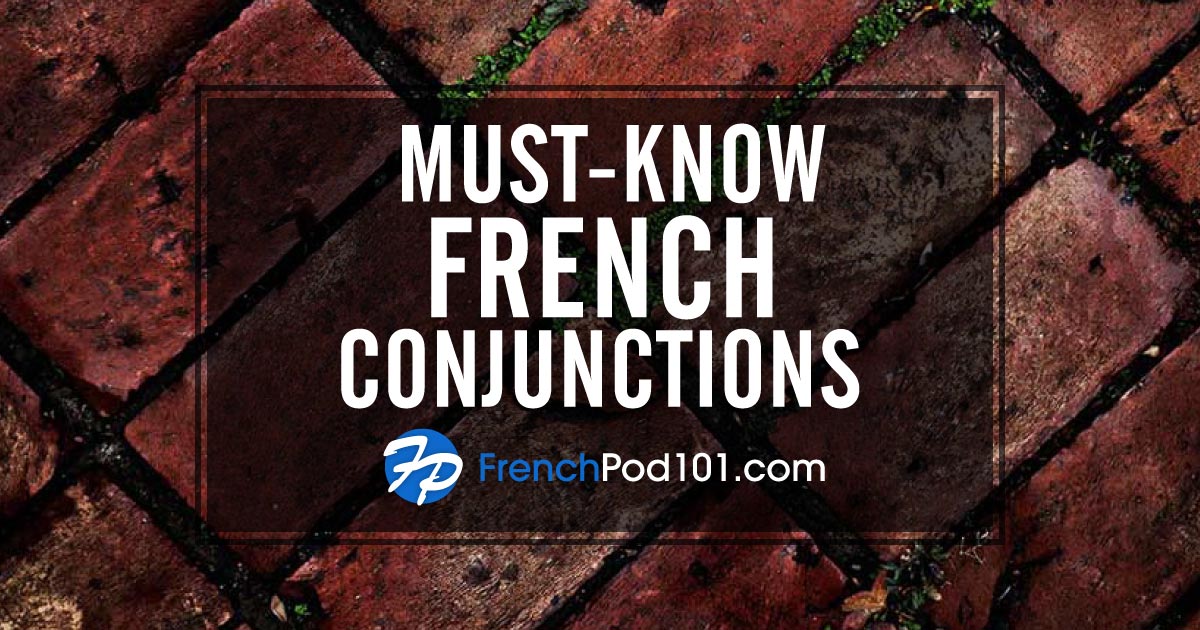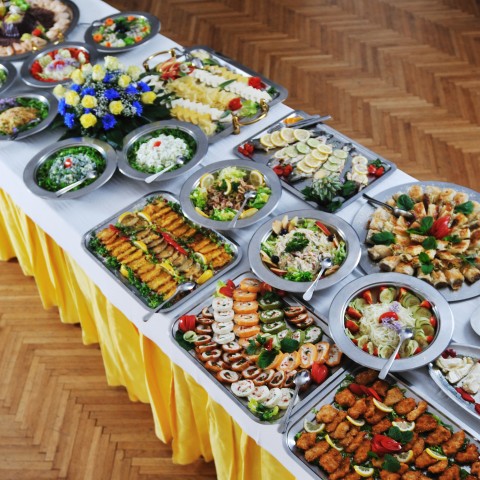Do you know what a conjunction is? Many people don’t, even though they use them every day, hundreds of times a day! Stick around to see our French conjunctions charts and more information on important French conjunctions.
Languages are all about connecting people, allowing them to understand each other and bond over a friendly conversation. Similarly, conjunctions connect words together, allowing them to make sense and become more than the sum of their parts.
French connecting words—also called conjunction words—are an important part of the language. You could learn as many vocabulary lists as you can possibly remember, but if you don’t know how to connect them with the right linking words, you’ll quickly feel limited in what you can express.
Is that enough to convince you it’s time to learn French conjunctions?
In this article, you’ll learn the most common French conjunctions and how to use them, with real-life examples. We’ll look at how to list things, how to express conditions and consequences, and much more. Oh, and we’ll also talk about food and love along the way!
Table of Contents
- What are French Conjunctions?
- Common French Conjunctions for Listing Things
- Setting Conditions with Basic French Conjunctions
- Useful French Conjunctions for Expressing Causality
- Objection, Your Honor!
- What is Your Purpose?
- Conjunctive What Now?
- How Frenchpod101 Can Help You Learn More French
1. What are French Conjunctions?
Conjunctions act as links between similar words or groups of words. They can convey various meanings and perform an array of actions, from listing things to expressing conditions or causality. If words were bricks, conjunctions would be the cement holding them together. If they were lasagnas, conjunctions would be the melty layer of cheese binding everything together. I’m sure you get the idea.
Now, I could bore you with the technicalities of French coordinating conjunctions, French subordinating conjunctions, and even French conjunctive phrases, but it wouldn’t help you remember any of them. And knowing the categories or their grammatical origin doesn’t bring much to the table. So why don’t we jump right in?
Here’s our list of common French conjunctions and some examples of French sentences with conjunctions.
2. Common French Conjunctions for Listing Things
Let’s talk about food, and how to list food. These conjunctions can be used to list anything, from dates to people, locations, and ideas, but we’ll stick to edible goodies for now. 🙂
et (and)
- Des fruits et des légumes
“Fruits and vegetables” - Du pain, du vin et du fromage
“Bread, wine, and cheese”
ou (or)
- Fromage ou dessert ?
“Cheese or dessert?” - Des pâtes, du riz ou des frites ?
“Pasta, rice, or French fries?”
ni (nor)
- Il ne mange ni viande ni poisson.
“He eats neither meat nor fish.”
The ni __ ni __ structure is a sort of “neither __ nor __,” but can often be translated with a simple “or,” such as: “He doesn’t eat meat or fish.”
You can use ni anytime you want to say “no” to several listed elements. And I say several, because it can be extended to more than just two:
Il ne mange ni viande ni poisson, ni oeufs, ni fromage.
“He doesn’t eat meat, fish, eggs, or cheese.”
Another useful expression with ni is ni l’un ni l’autre, which translates to “neither one, nor the other.”
It’s a perfect pick when you want to deny two things without repeating them:
– Tu préfères la viande ou le poisson ?
“Do you prefer meat or fish?”
– Ni l’un ni l’autre.
“Neither.”
Avoir l’embarras du choix (“To be spoilt for choice”)
soit (either.. or)
- Je prépare soit du thé, soit du café.
“I’ll make either tea or coffee.” - Soit des pommes, soit des poires, soit des bananes.
“Either apples, or pears, or bananas.”
Soit is the jealous version of ou that makes you choose exclusively. You won’t get any more than one of the items listed, so choose carefully!
Also keep in mind that the word soit can have a different meaning: “very well.”
For instance:
Donc, tu préfères du café ? Soit.
“So, you prefer the coffee? Very well.”
Don’t worry, though, with the context, there’s little to no chance that you could get them mixed up.
→ To learn more appetizing words and how to pronounce them, make sure to check out our free vocabulary list on Food Utensils and Tableware on FrenchPod101.
3. Setting Conditions with Basic French Conjunctions
“If,” “then,” and “else” are the bread-and-butter of every programmer, but are also involved in countless situations in our daily lives. They are among the most important conjunctions and, luckily, they behave similarly in French and English.
si (if)
- S’il n’y a plus de café, je prendrai du thé.
“If there is no more coffee, I will have tea.” - Je ne sais pas si je dois acheter du café ou si nous en avons assez.
“I don’t know if I should buy coffee or if we have enough.”
alors (then; so)
- Si tu ne bois rien d’autre, alors essaye au moins le vin.
“If you don’t drink anything else, then at least try the wine.”
Whereas si works just like”if,” alors is a mixed bag and can translate to “then” or “so.”
You can use it like “then,” but it gets a bit too formal for conversational style:
- Il y aura alors évidemment un dessert.
“Then, obviously, there will be a dessert!” - Vous oublierez alors tous vos soucis.
“You will then forget all your worries.”
Many times, alors can be translated as “so,” and tends to express consequence:
- Je n’ai pas bu, alors je rentre en voiture.
“I haven’t drunk, so I’m driving back home.”
Then, you have the cases of alors at the beginning or the end of a sentence:
- Alors, comment tu trouves le vin ?
“So, how do you like the wine?” - Tu reprendras bien un verre, alors !
“You will have another round, then!”
sinon (otherwise; literally “if not” when translated)
- Reprends un café, sinon tu vas t’endormir avant la fin.
“Take another coffee, otherwise you will fall asleep before the end.” - Je ne bois pas de vin, sinon je rentre à pied.
“I don’t drink wine, otherwise, I’m walking back home.”
→ Get a good boost of energy with our vocabulary list on Coffee. It has plenty of phrases and recordings to practice your pronunciation!
Un dernier pour la route ! (“One for the road!”)
4. Useful French Conjunctions for Expressing Causality
“Shallow men believe in luck or in circumstance. Strong men believe in cause and effect.”
― Ralph Waldo Emerson (1803-1882)
Just like conjunctions tie words together, causality is what ties the world together: actions causing reactions, and causes having consequences, in an endless domino effect.
But before we collapse under the weight of these philosophical considerations, let’s keep it light and talk about our lame excuses for not doing sports!
car (because) [Formal]
- Je ne peux pas courir car j’ai mal aux pieds.
“I cannot run because my feet hurt.”
parce que (because) [Less formal than car]
- Je ne vais pas à la gym parce qu’il fait trop chaud.
“I’m not going to the gym because it’s too hot.”
puisque (since; as)
- Puisque c’est un jour férié, le stade est sûrement fermé.
“Since it’s a holiday, the stadium is probably closed.”
comme (as; since)
- Comme je suis fatigué, je suis resté à la maison.
“As I’m feeling tired, I have stayed home.”
quand (when)
- Quand j’ai trop mangé, je ne peux faire de l’escalade.
“When I have overeaten, I cannot go climbing.”
lorsque (when)
- Lorsqu’il pleut, je ne vais pas m’entraîner.
“When it is raining, I’m not going to training.”
Une réaction en chaîne (“A chain reaction”)
donc (so; therefore)
- J’avais mal aux pieds, donc je suis resté chez moi.
“My feet were hurting, so I stayed home.”
alors (so; therefore)
- Il pleuvait, alors j’ai eu la flemme.
“It was raining, so I got lazy.”
du coup (so; therefore)
- J’étais épuisé, du coup j’ai fait la sieste.
“I was exhausted, so I took a nap.”
Keep in mind that you’ll usually have to choose whether you use a conjunction for the cause or the consequence, not both.
For example—back to philosophy—in the famous quote from René Descartes (or Gomez Pereira, depending on who you ask): Je pense, donc je suis. (I think, therefore I am.) You wouldn’t say “Because I think, therefore I am.” The same goes for French.
In this sentence, you have two possible slots for a conjunction: 1 je pense, 2 je suis.
And you can fill soit 1, soit 2 (either 1 or 2).
Therefore, you could rephrase this famous quote like this:
- Puisque je pense, je suis.
“Because I think, I am.” - Comme je pense, je suis.
“As I think, I am.” - Parce que je pense, je suis.
“Since I think, I am.”
Or like this:
- Je pense, alors je suis.
“I think, then I am.” - Je pense, du coup je suis.
“I think, so I am.”
If Descartes could read that last one, he would be spinning in his grave.
Or even put it upside down:
- Je suis car je pense.
“I am because I think.” - Je suis parce que je pense.
“I am because I think.”
A.I.s think. Therefore, are they?
5. Objection, Your Honor!
Next stop: how to use French conjunctions to attach two conflicting ideas by expressing an opposition or objection.
mais (but)
- J’ai un faible pour Leah mais elle est fiancée.
“I have a thing for Leah but she’s engaged.” - Il travaille lentement mais sûrement.
“He’s working slowly but steadily.”
The next two words, cependant and or, are best used in professional and formal speech or you may sound too stiff. I, for one, never use them in conversations, but only for formal writing.
cependant (however) [Formal]
- Je voudrais cependant lui parler.
“However, I would like to talk to her.”
or (now; but; however) [Formal]
This one can be used in two distinct ways:
1- or can introduce new information that will change the situation and have consequences, whether they are directly mentioned or not.
For instance:
- Elle partit seule dans les bois. Or, le loup y rôdait.
“She went alone through the woods. However, the wolf was lurking around.”
This new information about the wolf is important for what comes next in the story.
2- or can also introduce a new piece of information into reasoning and allow a conclusion to be drawn.
For example:
- La victime a été étranglée. Or, notre principal suspect est manchot. Donc, il ne peut pas être l’assassin.
“The victim was strangled. However, our prime suspect is a one-handed man. Therefore, he cannot be the killer.”

Objection ! (“Objection!”)
6. What is Your Purpose?
pour (for; to; so that)
- Je m’entraîne pour devenir plus fort.
“I train to grow stronger.” - C’est bon pour ta santé.
“It is good for your health.” - Un pour toi et un pour moi.
“One for you and one for me.” - Parle plus fort pour que je t’entende.
“Speak louder so that I can hear you.”
par (by; out of; with; using)
- Je te prends par la main.
“I take you by the hand.” - Les fruits sont mangés par des vers.
“The fruits are eaten by worms.” - Il a fait un choix par colère.
“He made a choice out of anger.” - La réunion commence par un discours.
“The meeting starts with a speech.”
7. Conjunctive What Now?
We’re almost done with our French conjunctions list, but before we can wrap it up, I need to tell you about “that.” Indeed, the French conjunction que (that) is so ubiquitous that I can’t stress enough how useful and important it is!
First, let’s have a look at its raw form, and then you’ll see how it combines with nearly half of the words from the French dictionary to create as many expressions. It’s quite similar to how phrasal verbs operate in English, but much simpler.
que (that)
- Tu penses qu’il va pleuvoir?
“Do you think that it will rain?” - Je sais que tu es là.
“I know that you are here.”
/! In English, you could omit “that” and say “Do you think it will rain?” or “I know you are here.” However, in French, you can never leave it out. The sentences above without que would not be grammatically correct.
You’ll also use que to compare two things. For example:
- Je bois plus de bière que d’eau.
“I drink more beer than water.” - La bière n’est pas aussi chère que le vin.
“Beer is not as expensive as wine.”
If you’re doubling up on conditions, you have to use que before the second condition:
- Comme je suis fatigué et que j’ai mal aux pieds, je ne vais pas à la gym ce soir.
“Since I’m tired and my feet hurt, I’m not going to the gym tonight.”
And if you’re not convinced yet, here’s a short list of the most common expressions including que. I can’t list them all here, but believe me, there are many.
Let’s talk about love, for a change!
Give some love to your French grammar book!
French conjunctions chart about love:
| Dès que | “As soon as” | Dès que je t’ai rencontrée, je suis tombé amoureux. “As soon as I met you, I fell in love.” |
| Depuis que | “Since” | Depuis que je te connais, je ne suis plus le même. “Since I’ve known you, I’m not the same man.” |
| Jusqu’à ce que | “Until” | Jusqu’à ce que la mort nous sépare. “Until death do us part.” |
| Afin que | “So that” | Elle travaille dur afin qu’il ne manque de rien. “She works hard so that he doesn’t lack anything.” |
| Pour que | “So that” | Je ferais tout pour que tu m’aimes. “I would do anything so that you love me.” |
| Vu que | “Seeing that” “Since” “As” |
Vu qu’ils vivent ensemble, ils sont devenus très proches. “As they live together, they have grown very close.” |
| Tant que | “As long as” “So much as” |
Je t’aimerai tant que je vivrai. “I will love you as long as I live.” |
| Alors que | “While” “Whereas” |
Je ne trouve pas le sommeil alors que je suis épuisé. “Whereas I’m exhausted, I cannot sleep.” |
| A moins que | “Unless” | Quitte-la, à moins que tu l’aimes toujours. “Leave her, unless you still love her.” |
| Bien que | “Although” | Il m’a brisé le coeur, bien que ce ne soit pas la première fois. “He broke my heart, although this is not the first time.” |
→ Warm the romantic cockles of your heart with our free vocabulary list on Love! You’ll find many great quotes in French with audio recordings.
8. How Frenchpod101 Can Help You Learn More French
In this guide, you’ve learned everything about French conjunctions, from how to list things to causality, conditions, and objection. You should have a much better idea now of French conjunctions and their meanings, as well as how to use a conjunction in French.
Did I forget any important linking words that you know? Do you feel ready to give more meaning to your words and bond with your French friends?
A good French conjunctions practice is to make phrases of your own, using each of them. Don’t hesitate to warm up with easy sentences and gradually add more complexity:
- Lorsque (when)
- Lorsque je te vois (when I see you)
- Lorsque je te vois, mon coeur s’emballe. (When I see you, my heart is racing.)
If you take it easy and go at your own pace, you’ll get used to conjunctions and it will open a whole new world of meaningful sentences.
FrenchPod101 also has tons of vocabulary lists with audio recordings and free resources to boost your studies and keep your French learning fresh and entertaining!
Remember that you can also use our premium service, MyTeacher, to get personal one-on-one coaching. You can practice conjunctions, and more, with your private teacher, using assignments, personalized exercises, and recorded audio samples to help improve your pronunciation. Happy learning on FrenchPod101!
About the Author: Born and bred in the rainy north of France, Cyril Danon has been bouncing off various jobs before he left everything behind to wander around the wonders of the World. Now, after quenching his wanderlust for the last few years, he’s eager to share his passion for languages.



















